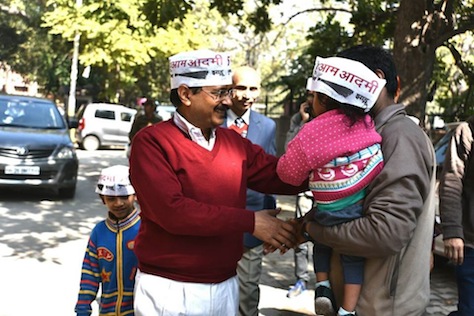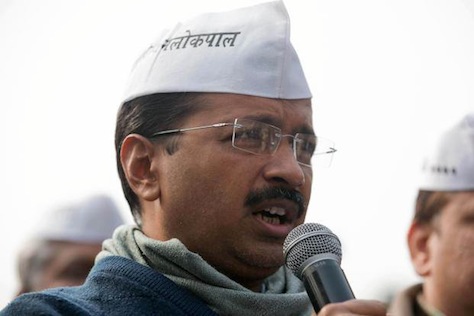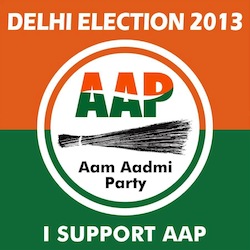When the former (and now future) Delhi chief minister Arvind Kejriwal challenged Narendra Modi for a seat in the Indian parliament from the symbolically and religiously important city of Varanasi last spring, it was a sign that Kejriwal, days after resigning from Delhi’s 49-day government, maybe bit off more than he could chew. ![]()
He lost. Badly.
Furthermore, instead of securing a national perch in Delhi, where Kejriwal (pictured above) and his newly formed Aam Aadmi Party (AAP, आम आदमी की पार्टी, literally the ‘Common Man’ Party) found such success in the 2013 Delhi regional elections, the party instead won none of the seven seats up for grabs to the lower house of the Indian parliament. The AAP managed to win four seats in Punjab only because of voter disgust with the corruption of the ruling Sikh nationalist party in that state.
Kejriwal’s decision to resign as chief minister, just 49 days after forming a minority AAP-led government to wage a national campaign looked like a disaster. The AAP, like many third parties, was largely swept aside by the Modi wave that gave the Bharatiya Janata Party (the BJP, or भारतीय जनता पार्टी) a landslide victory.
* * * * *
RELATED: Kejriwal’s AAP looks for second chance in Delhi vote
* * * * *
After Delhi’s government reverted to president’s rule, it seemed like the BJP would easily sweep to power there too, especially after winning regional elections last October in Maharashtra, the home of Mumbai (Bombay) and the second-most populous state in India.
Today, however, with the announcement that the AAP swept up an unexpectedly strong victory in voting on February 7 (winning 67 out of 70 seats in the Delhi legislative assembly), it’s no longer risible to think about Kejriwal competing on the same platform as Modi. Voters have given Kejriwal, whose AAP is barely two years old, a second chance to carry out his agenda of anti-corruption good governance. It’s the first time since Modi’s remarkable national victory last spring that any figure or group has decisively defeated the BJP at any level of Indian politics.
Remember that in the landscape-shifting December 2013 elections, the AAP won just 28 seats, four fewer than the BJP. It governed in an awkward alliance with the Indian National Congress (भारतीय राष्ट्रीय कांग्रेस) that, under former chief minister Sheila Dikshit, had governed Delhi for 15 years and, increasingly, became synonymous with corruption and incompetence.
 In the latest vote, Congress won no seats at all to Delhi’s legislative assembly. The party is still reeling after its massive rejection last spring. Congress won so few seats nationally that it cannot even appoint the leader of the opposition in the lower house of the Indian parliament, the Lok Sabha (लोक सभा). Since its defeat, there’s no sign that the Nehru-Gandhi family shows any sign of realizing that it must fundamentally change in order to regain the electorate’s trust. There’s no sign of any rising stars in the party from outside the family — if Rahul Gandhi proved uncharismatic and uninspired in 2014, it’s conceivable that his sister, Priyanka Vadra, might be the right answer for 2019.
In the latest vote, Congress won no seats at all to Delhi’s legislative assembly. The party is still reeling after its massive rejection last spring. Congress won so few seats nationally that it cannot even appoint the leader of the opposition in the lower house of the Indian parliament, the Lok Sabha (लोक सभा). Since its defeat, there’s no sign that the Nehru-Gandhi family shows any sign of realizing that it must fundamentally change in order to regain the electorate’s trust. There’s no sign of any rising stars in the party from outside the family — if Rahul Gandhi proved uncharismatic and uninspired in 2014, it’s conceivable that his sister, Priyanka Vadra, might be the right answer for 2019.
But given the uninspired leadership of the quasi-monarchical Gandhi family, Kejriwal has a real chance to eclipse Congress and build a new, populist force for the secular center-left in India, attracting votes from all castes and religions whose votes are no longer tied to the independence movement of the 1930s and 1940s. That’s provided that Kejriwal can, in the years ahead in Delhi, deliver on his promise of less corruption, better services and greater safety, especially for women. (Critics will note that there’s plenty of Hindu traditionalism lurking beneath the surface of the AAP movement, but that’s just as true for Congress as well or for any Indian party that wants to compete in a country where four-fifths of its population practice Hinduism). Continue reading Forget the Gandhis. Kejriwal is now India’s true opposition leader.



